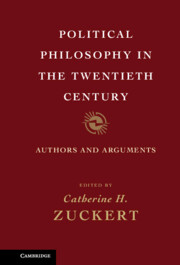Book contents
- Frontmatter
- Contents
- Contributors
- Introduction: political philosophy in the twentieth century
- Part I The three basic alternatives in the early twentieth century
- Part II ??migr?? responses to World War II
- Part III The revival of liberal political philosophy
- 8 Friedrich Hayek on the nature of social order and law
- 9 Michael Oakeshott: the philosophical skeptic in an impatient age
- 10 Moral pluralism and liberal democracy: Isaiah Berlin's heterodox liberalism
- 11 H. L. A. Hart: a twentieth-century Oxford political philosopher
- 12 John Rawls and the task of political philosophy
- 13 Richard Rorty: liberalism, irony, and social hope
- Part IV Critiques of liberalism
- Index
- References
8 - Friedrich Hayek on the nature of social order and law
Published online by Cambridge University Press: 05 June 2012
- Frontmatter
- Contents
- Contributors
- Introduction: political philosophy in the twentieth century
- Part I The three basic alternatives in the early twentieth century
- Part II ??migr?? responses to World War II
- Part III The revival of liberal political philosophy
- 8 Friedrich Hayek on the nature of social order and law
- 9 Michael Oakeshott: the philosophical skeptic in an impatient age
- 10 Moral pluralism and liberal democracy: Isaiah Berlin's heterodox liberalism
- 11 H. L. A. Hart: a twentieth-century Oxford political philosopher
- 12 John Rawls and the task of political philosophy
- 13 Richard Rorty: liberalism, irony, and social hope
- Part IV Critiques of liberalism
- Index
- References
Summary
The standing of F. A. Hayek (1899–1992) as one of the most important social and legal theorists of the twentieth century rests largely on the depth and insight of his challenge to two presumptions that dominated most twentieth-century social and legal thought. The first is the presumption that rational and beneficial social order must be intentionally planned or designed order; the second is that law must be the (intentional) command of an authority that, as the source of law, cannot itself be subject to law. This chapter presents the crucial elements of Hayek's challenge to these commonly held presumptions. Combined with an appreciation of the alternative conceptions of social order and law that Hayek offers, the recognition of the nature, pervasiveness, and falsity of these commonly held presumptions supports a radical and illuminating transformation in our understanding of the nature and value of social, economic, and legal order.
- Type
- Chapter
- Information
- Political Philosophy in the Twentieth CenturyAuthors and Arguments, pp. 129 - 141Publisher: Cambridge University PressPrint publication year: 2011

